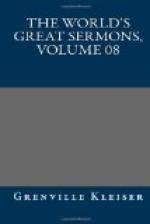You do not need to make a boast of this, or it will lose all its power; but do it because you cannot help doing it. Your neighbor will say, “There is something in that.” And when you come to the borders of the grave—he was there once, and you heard how he shrieked, and how frightened he was—give him your hand, and say to him, “Ah! I have a Christ that will do to die by; I have a religion that will make me sing in the night.” Let me hear how you can sing, “Victory, victory, victory!” through Him that loved you. I tell you, we may preach fifty thousand sermons to prove the gospel, but we shall not prove it half so well as you will through singing in the night. Keep a cheerful frame; keep a happy heart; keep a contented spirit; keep your eye up, and your heart aloft, and you prove Christianity better than all the Butlers, and all the wise men that ever lived. Give them the analogy of a holy life, and then you will prove religion to them; give them, the evidence of internal piety, developed externally, and you will give the best possible proof of Christianity.
POTTER
MEMORIAL DISCOURSE ON PHILLIPS BROOKS
BIOGRAPHICAL NOTE
Henry Codman Potter was born at Schenectady, New York, in 1834, and was graduated from the Theological Seminary of Virginia in 1857. He was appointed rector of Grace Protestant Episcopal Church, New York, in 1868, and was coadjutor to his uncle, Horatio Potter, from 1883 to 1887, when he was made Bishop of the Diocese of New York. He won considerable distinction as a clear-cut and eloquent speaker. He dealt in pulpit and on platform, with many public questions, such as temperance, capital and labor, civic righteousness, and the purifying of East Side slum life. He advocated personal freedom, and invariably spoke with authority. He was particularly happy as an after-dinner speaker. He died in 1908.
POTTER
1834—1908
Memorial discourse on Phillips brooks[1]
[Footnote 1: Reprinted by permission of Bishop Henry C. Potter and The Century Company, publishers of “The Scholar and the State.”]
It is the spirit that quickeneth; the flesh profiteth nothing: the words I speak unto you, they are spirit, and they are life.—John vi., 63.
He who stops over-long in the mere mechanism of religion is verily missing that for which religion stands. Here, indeed, it must be owned is, if not our greatest danger, one of the greatest. All life is full of that strange want of intellectual and moral perspective which fails to see how secondary, after all, are means to ends; and how he only has truly apprehended the office of religion who has learned, when undertaking in any wise to present it or represent it, to hold fast to that which is the one central thought and fact of all: “It is the spirit that quickeneth; the flesh profiteth nothing: the words that I speak unto you, they are spirit, and they are life.”




